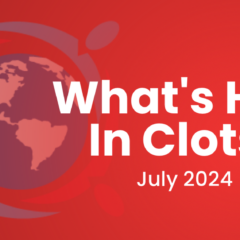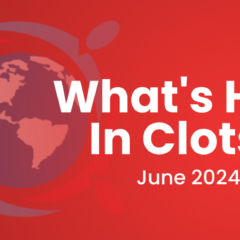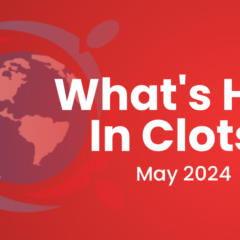Last updated on
What’s Hot in Clots – November 2022
Key Updates in Thrombosis
Table of Contents
- Thromboprophylaxis in pregnant women with a history of VTE: High or low?
- Conventional catheter-based fibrinolysis for intermediate-high-risk PE: Did the CANARY come out of the coal mine?
- Shortage of fibrinolytic therapy agents: Be cognizant for stroke and PE care
- Aspirin vs P2Y12 inhibitors after discontinuation of DAPT: Is there a winner?
There have been a lot of happenings over the past few weeks! PROACT Xa was stopped prematurely, due to concern for excess stroke events, effectively closing the door on DOACs for management of patients with mechanical valves. NATF’s Thrombosis & Thromboembolism course was awesome, thanks to the wisdom of Drs. Sam Goldhaber, Paul Ridker, and Gregory Piazza and the enormous work by the NATF team. Tough to pick a favorite from many great talks, but if I must, it should go to a lecture that had nothing to do with thrombosis but came from the one and only Dr. Braunwald. Through his experience of encountering the – at the time – unknown entity of hypertrophic cardiomyopathy, we all learned so much from his amazing journey about how to be thoughtful, collaborative, open-minded, and resilient to discover new conditions and treatments.
And my traditional picks of the month:
Thromboprophylaxis in pregnant women with a history of VTE: High or low?
I covered the HIGHLOW trial after its presentation at ISTH. However, it deserves a mention again, as it’s one of the very few large-scale RCTs of antithrombotic therapy in pregnant patients. It showed that during the course of pregnancy, low-dose prophylaxis with low-molecular-weight heparin would be sufficient. (In other words, intermediate-dose prophylactic anticoagulation did not meet criteria for superiority). In post-hoc analyses of the pospartum period, it appeared that postpartum risk of thrombotic events was lower in those receiving intermediate-dose anticoagulation, a finding that may be tested in future dedicated trials. Will intermediate-dose anticoagulation finally find a safe home? Learn more!
Conventional catheter-based fibrinolysis for intermediate-high-risk PE: Did the CANARY come out of the coal mine?
In patients with intermediate-high-risk pulmonary embolism (PE), the Catheter-Directed Thrombolysis vs Anticoagulation in Patients with Acute Intermediate-High–Risk Pulmonary Embolism (CANARY) trial was prematurely terminated due to constraints imposed by the COVID-19 pandemic. In this context, the trial did not meet the prespecified primary outcome of a 3-month reduction in the proportion of patients with an RV/LV ratio <1. However, several of the secondary findings, both at 72 hours and 3 months post-randomization, were favorable. The editorial commentary shares hope for the results of other ongoing randomized trials for patients with intermediate-high-risk PE. Learn more!
Shortage of fibrinolytic therapy agents: Be cognizant for stroke and PE care
There are concerning reports about a widespread shortage of fibrinolytic agents due to production issues. This issue may have implications for both stroke care and the management of patients with high-risk and intermediate-high-risk PE. In addition to the appropriate allocation of available resources, local/regional professional organizations and treatment committees in individual hospitals may help by considering alternative management strategies as needed. Learn more!
Aspirin vs P2Y12 inhibitors after discontinuation of DAPT: Is there a winner?
The optimal duration of dual antiplatelet therapy (DAPT) after percutaneous coronary intervention (PCI) has been under intense investigation and may depend on patient risk factors, anatomical factors, and the type, location, and success of the stent(s) deployed. However, the question of using aspirin vs P2Y12 inhibitors as monotherapy after completion of DAPT remains unanswered. This network meta-analysis suggests an increased risk of myocardial infarction (MI), without a significant difference in risk of other outcomes with aspirin vs P2Y12 inhibitors. Dedicated RCTs are needed to verify these results. Learn more!
Enjoy reading these updates? Be sure to subscribe to get the latest updates each month!

Behnood Bikdeli, MD, MS
Cardiologist, Section of Vascular Medicine, Division of Cardiovascular Medicine, Brigham and Women’s Hospital
Investigator, Thrombosis Research Group, Division of Cardiovascular Medicine, Brigham and Women’s Hospital
Instructor, Harvard Medical School
Investigator, Yale/ YNHH Center for Outcomes Research and Evaluation, Yale School of Medicine
Investigator, Cardiovascular Research Foundation



